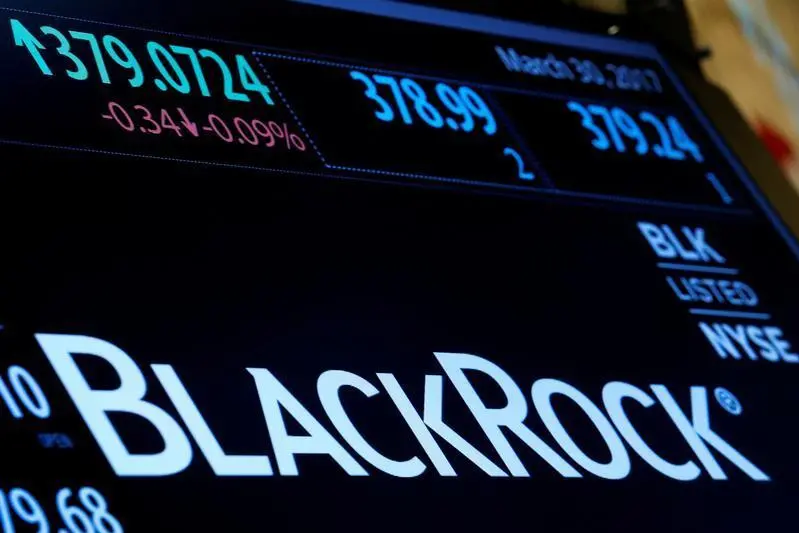PHOTO
Assets at BlackRock hit a record $10.5 trillion in the first quarter and the firm posted a 36% jump in profit as rising global equity markets boosted its investment advisory and administration fees, the world's largest asset manager said on Friday.
Global stock markets rallied in the first quarter on expectations that the world's major central banks were done with monetary policy tightening and would pivot to cutting interest rates, helping boost BlackRock’s assets under management (AUM). The MSCI's gauge of global stock performance rose 7.7% in the first three months of the year, while the S&P 500 jumped 10%.
BlackRock's AUM surged 15% in the first quarter from a year earlier, while investment advisory and administration fees, typically a percentage of AUM and the company's chief source of revenue, climbed nearly 8.8% to $3.63 billion.
"I see the greatest opportunities I've ever seen for BlackRock, for our clients, and for our shareholders," Larry Fink, the company's chairman and CEO, said during a conference call to discuss the results.
He mentioned investor opportunities in areas such as artificial intelligence, certain emerging markets, and the need for new infrastructure.
BlackRock announced in January the acquisition of Global Infrastructure Partners for $12.5 billion, as the asset manager aims to expand into private markets and alternative assets through infrastructure investments around the globe.
The acquisition is still on track to close in the third quarter, BlackRock Chief Financial Officer Martin Small said.
Fink said BlackRock would remain "open-minded" to pursue more private market opportunities, though he did not suggest any other deal was forthcoming.
BlackRock was in the final stages of winning large mandates that would drive future asset flows as well as new clients for its technology platform Aladdin, he added.
“Results were better than feared and they seem really upbeat and confident about growth accelerating” said Kyle Sanders, senior equity research analyst at Edward Jones.
Shares of the company were up 0.3% in early trading. They are down about 3.4% this year.
INFLOWS
Total net inflows fell to $57 billion from $110 billion a year earlier. That was partly due to some $14 billion in seasonal outflows from institutional money market funds at the end of March, Small said, adding that those were followed by $20 billion of money market net inflows in the first week of April.
BlackRock's President Rob Kapito said on Friday inflation worries and an inverted Treasury yield curve were delaying more allocations to fixed income.
Fixed income investors are sensitive to rising inflation as it erodes the value of their future cash flows.
Analysts expect asset management industry flows to reaccelerate after interest rate cuts begin, as that would incentivize the movement of cash piles currently on the sidelines into riskier assets.
Still, first-quarter net flows into fixed income products of nearly $42 billion were better than expected, said Sanders at Edward Jones.
"I think it's a matter of when, not if. Once you get one or two rate cuts under your belt, you'll start seeing money flow into those products," he said.
Exchange-traded funds captured the majority of inflows, which were also boosted by BlackRock's iShares Bitcoin Trust , which has drawn $14 billion in net inflows in the first quarter since its January launch.
The company's total revenue jumped 11% to $4.73 billion in the quarter, driven by higher performance fees and technology revenue as well the impact of higher markets on average AUM.
BlackRock provides investment management and technology services to retail and institutional clients globally, including sovereign wealth funds, insurance companies, and large corporations.
Its technology revenue jumped about 10.9% to $377 million, reflecting sustained demand for its investment risk management platform Aladdin.
Net income for the company rose to $1.57 billion, or $10.48 per share, in the three months ended March 31, from $1.16 billion, or $7.64 per share, a year earlier.
(Reporting by Arasu Kannagi Basil in Bengaluru; Editing by Shinjini Ganguli, Ira Iosebashvili, Paul Simao and Jonathan Oatis)




















